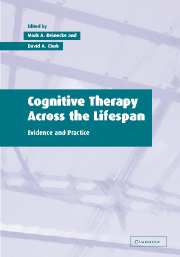Book contents
- Frontmatter
- Contents
- List of contributors
- Foreword
- 1 Cognitive therapy across the lifespan: conceptual horizons
- 2 Cognitive theory and therapy of depression
- 3 Cognitive theory and therapy of bipolar disorders
- 4 Regulation of emotion in generalized anxiety disorder
- 5 Cognitive theory and therapy of obsessions and compulsions
- 6 The cognitive model of panic
- 7 Treating obsessional problems using cognitive-behavioral therapy
- 8 Narcissistic personality disorder
- 9 Cognitive therapy and the self
- 10 Promoting cognitive change in posttraumatic stress disorder
- 11 Cognitive theory and therapy of social phobia
- 12 The cognitive model of bulimia nervosa
- 13 Cognitive therapy and schizophrenia
- 14 Cognitive-behavioral interventions for alcohol abuse and dependence
- 15 Cognitive approaches to understanding, preventing and treating child and adolescent depression
- 16 Cognitive-behavioral interventions in childhood anxiety disorders
- 17 Attention deficit/hyperactivity disorder
- 18 Cognitive-behavioral interventions for children with conduct problems
- 19 Processes of change in cognitive therapy
- 20 Cognitive therapy in the twenty-first century: current status and future directions
- Index
8 - Narcissistic personality disorder
Published online by Cambridge University Press: 05 July 2014
- Frontmatter
- Contents
- List of contributors
- Foreword
- 1 Cognitive therapy across the lifespan: conceptual horizons
- 2 Cognitive theory and therapy of depression
- 3 Cognitive theory and therapy of bipolar disorders
- 4 Regulation of emotion in generalized anxiety disorder
- 5 Cognitive theory and therapy of obsessions and compulsions
- 6 The cognitive model of panic
- 7 Treating obsessional problems using cognitive-behavioral therapy
- 8 Narcissistic personality disorder
- 9 Cognitive therapy and the self
- 10 Promoting cognitive change in posttraumatic stress disorder
- 11 Cognitive theory and therapy of social phobia
- 12 The cognitive model of bulimia nervosa
- 13 Cognitive therapy and schizophrenia
- 14 Cognitive-behavioral interventions for alcohol abuse and dependence
- 15 Cognitive approaches to understanding, preventing and treating child and adolescent depression
- 16 Cognitive-behavioral interventions in childhood anxiety disorders
- 17 Attention deficit/hyperactivity disorder
- 18 Cognitive-behavioral interventions for children with conduct problems
- 19 Processes of change in cognitive therapy
- 20 Cognitive therapy in the twenty-first century: current status and future directions
- Index
Summary
Self-interest, in moderation, is necessary for healthy functioning. From an evolutionary perspective, the desire to thrive and succeed has survival value, and is likely to be genetically selected (Stone, 1998). Indeed, it is widely held (most notably in modern western cultures) that self-esteem is a desirable trait, and that the pursuit of “the good life” is a worthy path in order to make the most out of one's time on earth. There is some evidence that those who like and respect themselves are less vulnerable to the kinds of life stressors that might otherwise cause others to lapse into despair (Seligman, 1991; Ryff and Singer, 1996, 1998). In addition, it has been proposed that a prerequisite to giving true love to another is the ability to give acceptance and compassion to oneself (Erikson, 1964). From this standpoint, it would seem that clinicians do their clients – and society at large – a service by helping clients develop higher regard for themselves, along with improved moods and motivations.
However, like almost everything else in our delicately balanced existence, the overabundance of a seemingly good thing can become a problem. For example, too much individual freedom without regulations and laws can threaten to become destructive anarchy. Likewise, a medication that can alleviate an illness, when taken to excess can lead to premature death.
- Type
- Chapter
- Information
- Cognitive Therapy across the LifespanEvidence and Practice, pp. 172 - 201Publisher: Cambridge University PressPrint publication year: 2003
- 2
- Cited by



